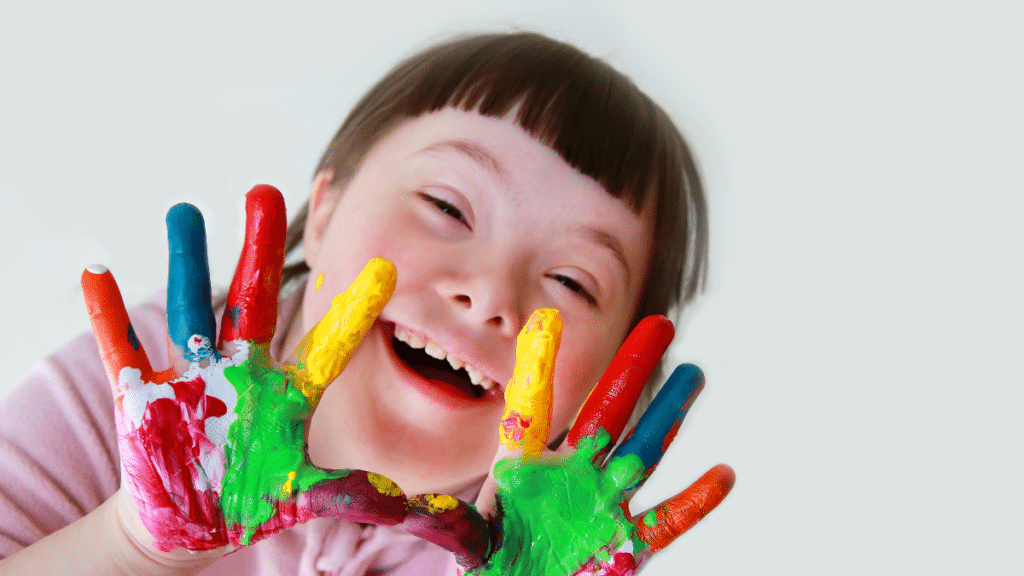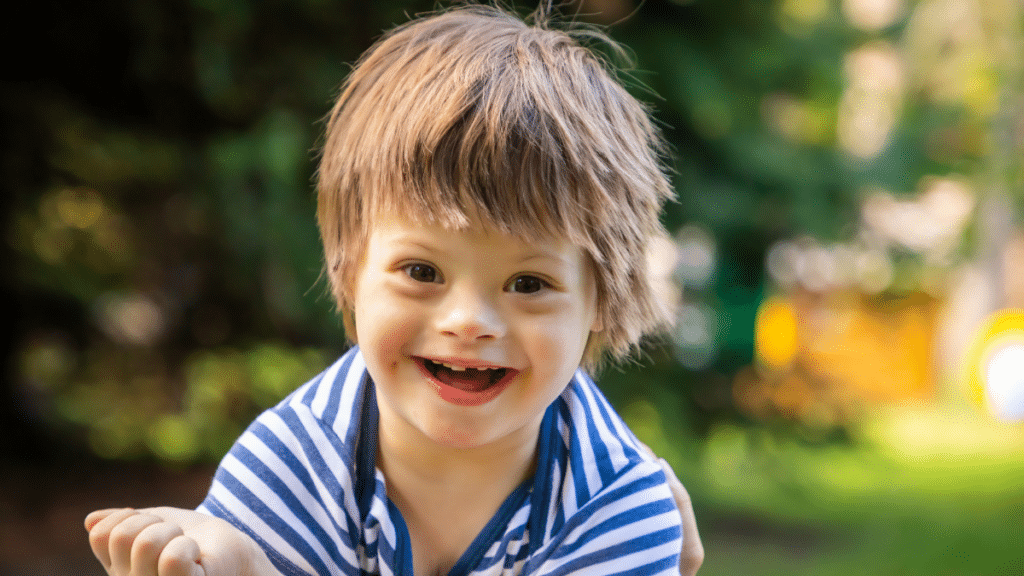Children with Down syndrome often face special social challenges due to their cognitive and developmental differences.
While each child with Down syndrome is special and may have varying abilities, addressing their social needs early on can help them develop essential interpersonal skills.
In this article, we will explore some of the social challenges children with Down syndrome face and provide strategies for social skill development.
Social challenges faced by children with Down Syndrome
Children with Down syndrome may have difficulty socializing due to their cognitive and developmental differences.
They may struggle to understand
- Social cues.
- Language.
- Emotions.
Thus, such factors render forming and maintaining relationships difficult for them.
Additionally, sensory and behavioral challenges can make social situations overwhelming and stressful for children with Down syndrome.
Furthermore, children with Down syndrome might face other hardships, including
- Many children with Down syndrome have difficulty expressing their feelings because of their poor communication and language skills.
- Some children with Down syndrome face hardships controlling their muscles and coordinating their hand movements.
- Children with Down syndrome have some cognitive disabilities that make it hard for them to comprehend information.
- Down syndrome children often experience mental health issues, such as depression and anxiety.
- Down syndrome children are often the targets of bullying from other children due to their differences and disabilities.
The importance of addressing social needs early
Therefore, addressing social needs early on is crucial for children with Down syndrome, as it can help them develop essential social skills that will benefit them throughout their lives.
Early intervention services, such as speech and language, occupational, and physical therapy, can help address these social needs and promote development in children with Down syndrome.
That is, such programs can help them learn how to interact effectively with people around them, such as their peers and teachers.
These services can help children with Down syndrome acquire important skills and abilities that will help them in their daily lives and improve their overall quality of life.
In addition to early intervention services, addressing social needs such as access to educational opportunities, socialization with peers, and community inclusion can positively impact the development of children with Down syndrome.
Furthermore, early intervention programs help that category of children reduce problem behaviors, which increases their chances of success in school and other activities.
By addressing these social needs early, children with Down syndrome can have a better chance of reaching their full potential and living fulfilling lives.
Early intervention programs can also help children with Down syndrome build self-confidence and self-esteem, which can improve the quality of their lives substantially.
Social skills development strategies for children with Down Syndrome
In addition to early intervention programs, there are several social skills development strategies that parents and caregivers can use to help children with Down syndrome develop social skills. The following are some effective strategies:
Establishing routines and predictable schedules
Children with Down syndrome may benefit from structured routines and predictable schedules. This can help them feel more secure and reduce anxiety in social situations.
It can also provide them with a secure environment where they are able to improve their social learning skills.
Moreover, routines and predictable schedules can help children with Down syndrome improve their social skills by providing them with predictability and structure in their environment.
Consistent routines and programs can also help with communication and understanding expectations.
Creating opportunities for social interaction
Providing opportunities for social interaction can help children with Down syndrome develop social skills. This may include playdates, group activities, and social events.
Creating a safe and supportive environment that allows for social interaction at the child’s pace is important.
Other opportunities for social interaction that could help children with Down syndrome include the following:
- Joining a local support group.
- Participating in local recreational activities and sports teams.
- Including them in family gatherings and helping them to bond with family members.

Enhancing communication skills
Enhancing communication skills is critical for socialization, and children with Down syndrome may benefit from extra support.
The following strategies can serve as supportive mechanisms that could help improve the communication skills of children with Down syndrome:
Using visual supports for communication
Visual supports such as pictures, symbols, and gestures can help children with Down syndrome understand and express their thoughts and emotions.
Encouraging verbal and non-verbal communication
Encouraging verbal and non-verbal communication skills can help children with Down syndrome develop their relationships with many people around them.
Such skills may include using simple language, modeling appropriate communication skills, and providing opportunities for practice.
Building social skills through play
In addition to improving social skills for children with Down syndrome, play is essential to social development and can be particularly helpful for their social development.
The following strategies can help build social skills through play:
Engaging in cooperative play
Cooperative play (like games that require cooperation and teamwork) can help children with Down syndrome learn critical social skills such as turn-taking, sharing, and problem-solving.
Such skills can help Down syndrome children listen to others and recognize their feelings, as well as use the proper social behaviors to interact with their peers.
Practicing turn-taking and sharing
Practicing turn-taking and sharing activities, such as passing a ball or sharing toys, can help children with Down syndrome learn to take turns and share with others.
Additionally, practicing turn-taking and sharing can help Down syndrome children develop their social skills, language skills, and self-regulation skills.
Thus, enabling them to better express themselves and cooperate with others.
Role-playing social situations
Role-playing social situations such as greetings, conversations, and problem-solving can help children with Down syndrome practice social skills in a safe and supportive environment.
In addition, role-playing social situations provide children with Down syndrome with the opportunity to practice and refine these skills in a safe and supportive environment.
Common challenges and strategies to address them
On the other hand, children with Down syndrome may face various challenges impacting their social development.
The following are some common challenges and strategies to address them:
Cognitive and language challenges
Some of the strategies that could help address cognitive and language challenges that impede the social development of Down syndrome children include the following:
- Speech therapy.
- Play.
- Assistive technology.
- Positive reinforcement.
- Educational programs.
Sensory challenges
Addressing the sensory challenges that face Down syndrome children includes facilitating a sensory-friendly environment for them to help reduce their stress in social interactions and improve their socialization skills.

Behavioral challenges
Some of the behavioral challenges that face children with Down syndrome include:
- Difficulty with communication.
- Challenges with transitions.
- Poor impulse control.
Addressing these challenges through behavioral therapy and providing positive reinforcement can help improve the socialization skills of children with Down syndrome.
Donate to refugee children with Down Syndrome
As the Bonyan Organization, we are dedicated to providing medical, social, psychological, and educational support and services to children with Down syndrome and their families in refugee settings.
This is because Bonyan believes that every child deserves the opportunity to reach their full potential and live fulfilling lives, regardless of their special circumstances.
We are particularly concerned about refugee children with Down syndrome who may face additional challenges due to their cases.
Down syndrome children may lack access to essential services and support, impacting their development and well-being.
That is why we are calling on our community to support our efforts and help refugee children with Down syndrome.
Your benevolent donations can help fund the necessary programs and services that support families, including early intervention and educational initiatives, therapy sessions, and support groups.
With your help, we can make a positive difference in these children’s and their families’ lives so that we can together build a better future for them.
So, what are you waiting for?
Join our mission of supporting refugee children and enhancing the quality of their lives by donating to our campaigns at the link below:
https://www.launchgood.com/communitypage/bonyan_organization#!/community/bonyan_organization/
References
FAQ
How can you improve the social skills of a child with Down syndrome?
You can improve the social skills of a child with Down syndrome by:
-Creating opportunities for social interaction.
-Enhancing communication skills.
-Building social skills through play.
-Providing a safe and supportive environment that allows for socialization at the child’s pace is essential.
How does Down syndrome affect children’s social development?
Down syndrome affects children’s social development by impacting their understanding of social cues, language, and emotions. Sensory and behavioral challenges can also make social situations overwhelming and stressful for children with Down syndrome.
How do people with Down syndrome act socially?
People with Down syndrome can act socially in various ways, just like anyone else. They may have unique challenges and strengths in socialization and may require extra support and accommodations to help them develop essential social skills.
What are the social needs of a person with Down syndrome?
The social needs of a person with Down syndrome may include opportunities for social interaction, enhanced communication skills, and support to develop social skills such as turn-taking, sharing, and problem-solving.
Content
- Social challenges faced by children with Down Syndrome
- The importance of addressing social needs early
- Social skills development strategies for children with Down Syndrome
- Enhancing communication skills
- Building social skills through play
- Common challenges and strategies to address them
- Donate to refugee children with Down Syndrome
- References
- FAQ



